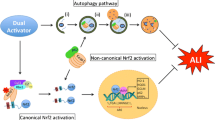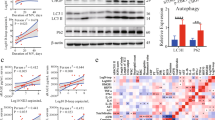Abstract
Autophagy has emerged as a key regulator of the inflammatory response. To examine the role of autophagy in the development of organ dysfunction during endotoxemia, wild-type and autophagy-deficient (Atg4b-null) mice were challenged with lipopolysaccharide. Animals lacking Atg4b showed increased mortality after endotoxemia. Among the different organs studied, only the lungs showed significant differences between genotypes, with increased damage in mutant animals. Autophagy was activated in lungs from wild-type, LPS-treated mice. Similarly, human bronchial cells show an increased autophagy when exposed to serum from septic patients. We found an increased inflammatory response (increased neutrophilic infiltration, higher levels of Il6, Il12p40, and Cxcl2) in the lungs from knockout mice and identified perinuclear sequestration of the anti-inflammatory transcription factor ATF3 as the putative mechanism responsible for the differences between genotypes. Finally, induction of autophagy by starvation before LPS exposure resulted in a dampened pulmonary response to LPS in wild-type, but not knockout, mice. Similar results were found in human bronchial cells exposed to LPS. Our results demonstrate the central role of autophagy in the regulation of the lung response to endotoxemia and sepsis and its potential modulation by nutrition.
Key messages
-
Endotoxemia and sepsis trigger autophagy in lung tissue.
-
Defective autophagy increases mortality and lung inflammation after endotoxemia.
-
Impairment of autophagy results is perinuclear ATF3 sequestration.
-
Starvation ameliorates lung injury by an autophagy-dependent mechanism.






Similar content being viewed by others
References
Gustot T (2011) Multiple organ failure in sepsis: prognosis and role of systemic inflammatory response. Curr Opin Crit Care 17:153–159
Schwartz MD, Moore EE, Moore FA, Shenkar R, Moine P, Haenel JB, Abraham E (1996) Nuclear factor-kappa B is activated in alveolar macrophages from patients with acute respiratory distress syndrome. Crit Care Med 24:1285–1292
Gonzalez-Lopez A, Aguirre A, Lopez-Alonso I, Amado L, Astudillo A, Fernandez-Garcia MS, Suarez MF, Batalla-Solis E, Colado E, Albaiceta GM (2012) MMP-8 deficiency increases TLR/RAGE ligands S100A8 and S100A9 and exacerbates lung inflammation during endotoxemia. PLoS ONE 7:e39940
Gilchrist M, Thorsson V, Li B, Rust AG, Korb M, Roach JC, Kennedy K, Hai T, Bolouri H, Aderem A (2006) Systems biology approaches identify ATF3 as a negative regulator of Toll-like receptor 4. Nature 441:173–178
Yang Z, Klionsky DJ (2010) Eaten alive: a history of macroautophagy. Nat Cell Biol 12:814–822
Marino G, Lopez-Otin C (2004) Autophagy: molecular mechanisms, physiological functions and relevance in human pathology. Cell Mol Life Sci 61:1439–1454
Haspel JA, Choi AM (2011) Autophagy: a core cellular process with emerging links to pulmonary disease. Am J Respir Crit Care Med 184:1237–1246
Lopez-Alonso I, Aguirre A, Gonzalez-Lopez A, Fernandez AF, Amado-Rodriguez L, Astudillo A, Batalla-Solis E, Albaiceta GM (2013) Impairment of autophagy decreases ventilator-induced lung injury by blockade of the NF-kappaB pathway. Am J Physiol Lung Cell Mol Physiol 304:L844–L852
Singer M (2008) Cellular dysfunction in sepsis. Clin Chest Med 29:655–660, viii-ix
Levine B, Mizushima N, Virgin HW (2011) Autophagy in immunity and inflammation. Nature 469:323–335
Marino G, Fernandez AF, Cabrera S, Lundberg YW, Cabanillas R, Rodriguez F, Salvador-Montoliu N, Vega JA, Germana A, Fueyo A et al (2010) Autophagy is essential for mouse sense of balance. J Clin Invest 120:2331–2344
Cabrera S, Fernandez AF, Marino G, Aguirre A, Suarez MF, Espanol Y, Vega JA, Laura R, Fueyo A, Fernandez-Garcia MS et al (2013) ATG4B/autophagin-1 regulates intestinal homeostasis and protects mice from experimental colitis. Autophagy 9:1188–1200
Gonzalez-Lopez A, Astudillo A, Garcia-Prieto E, Fernandez-Garcia MS, Lopez-Vazquez A, Batalla-Solis E, Taboada F, Fueyo A, Albaiceta GM (2011) Inflammation and matrix remodeling during repair of ventilator-induced lung injury. Am J Physiol Lung Cell Mol Physiol 301:L500–L509
Albaiceta GM, Gutierrez-Fernandez A, Parra D, Astudillo A, Garcia-Prieto E, Taboada F, Fueyo A (2008) Lack of matrix metalloproteinase-9 worsens ventilator-induced lung injury. Am J Physiol Lung Cell Mol Physiol 294:L535–L543
Matute-Bello G, Downey G, Moore BB, Groshong SD, Matthay MA, Slutsky AS, Kuebler WM (2011) An official American Thoracic Society workshop report: features and measurements of experimental acute lung injury in animals. Am J Respir Cell Mol Biol 44:725–738
Klionsky DJ, Abdalla FC, Abeliovich H, Abraham RT, Acevedo-Arozena A, Adeli K, Agholme L, Agnello M, Agostinis P, Aguirre-Ghiso JA et al (2012) Guidelines for the use and interpretation of assays for monitoring autophagy. Autophagy 8:445–544
Hussain SN, Mofarrahi M, Sigala I, Kim HC, Vassilakopoulos T, Maltais F, Bellenis I, Chaturvedi R, Gottfried SB, Metrakos P et al (2010) Mechanical ventilation-induced diaphragm disuse in humans triggers autophagy. Am J Respir Crit Care Med 182:1377–1386
Sanz L, Diaz-Meco MT, Nakano H, Moscat J (2000) The atypical PKC-interacting protein p62 channels NF-kappaB activation by the IL-1-TRAF6 pathway. EMBO J 19:1576–1586
Criollo A, Chereau F, Malik SA, Niso-Santano M, Marino G, Galluzzi L, Maiuri MC, Baud V, Kroemer G (2012) Autophagy is required for the activation of NFkappaB. Cell Cycle 11:194–199
Nakahira K, Haspel JA, Rathinam VA, Lee SJ, Dolinay T, Lam HC, Englert JA, Rabinovitch M, Cernadas M, Kim HP et al (2011) Autophagy proteins regulate innate immune responses by inhibiting the release of mitochondrial DNA mediated by the NALP3 inflammasome. Nat Immunol 12:222–230
Komatsu M, Waguri S, Koike M, Sou YS, Ueno T, Hara T, Mizushima N, Iwata J, Ezaki J, Murata S et al (2007) Homeostatic levels of p62 control cytoplasmic inclusion body formation in autophagy-deficient mice. Cell 131:1149–1163
Knaevelsrud H, Simonsen A (2010) Fighting disease by selective autophagy of aggregate-prone proteins. FEBS Lett 584:2635–2645
Maiuri L, Luciani A, Giardino I, Raia V, Villella VR, D’Apolito M, Pettoello-Mantovani M, Guido S, Ciacci C, Cimmino M et al (2008) Tissue transglutaminase activation modulates inflammation in cystic fibrosis via PPARgamma down-regulation. J Immunol 180:7697–7705
Moscat J, Diaz-Meco MT (2009) To aggregate or not to aggregate? A new role for p62. EMBO Rep 10:804
Akram A, Han B, Masoom H, Peng C, Lam E, Litvack ML, Bai X, Shan Y, Hai T, Batt J et al (2010) Activating transcription factor 3 confers protection against ventilator-induced lung injury. Am J Respir Crit Care Med 182:489–500
Gilchrist M, Henderson WR Jr, Clark AE, Simmons RM, Ye X, Smith KD, Aderem A (2008) Activating transcription factor 3 is a negative regulator of allergic pulmonary inflammation. J Exp Med 205:2349–2357
Tattoli I, Sorbara MT, Vuckovic D, Ling A, Soares F, Carneiro LA, Yang C, Emili A, Philpott DJ, Girardin SE (2012) Amino acid starvation induced by invasive bacterial pathogens triggers an innate host defense program. Cell Host Microbe 11:563–575
Whitmore MM, Iparraguirre A, Kubelka L, Weninger W, Hai T, Williams BR (2007) Negative regulation of TLR-signaling pathways by activating transcription factor-3. J Immunol 179:3622–3630
Yan C, Boyd DD (2006) ATF3 regulates the stability of p53: a link to cancer. Cell Cycle 5:926–929
Krakauer T, Buckley M, Issaq HJ, Fox SD (2010) Rapamycin protects mice from staphylococcal enterotoxin B-induced toxic shock and blocks cytokine release in vitro and in vivo. Antimicrob Agents Chemother 54:1125–1131
Tsuchiya T, Higami Y, Komatsu T, Tanaka K, Honda S, Yamaza H, Chiba T, Ayabe H, Shimokawa I (2005) Acute stress response in calorie-restricted rats to lipopolysaccharide-induced inflammation. Mech Ageing Dev 126:568–579
Oarada M, Miki T, Kohno S, Sakai K, Nikawa T, Yoneyama M, Gonoi T (2013) Refeeding with a standard diet after a 48-h fast elicits an inflammatory response in the mouse liver. J Nutr Biochem 24:1314–1323
Vanhorebeek I, Gunst J, Derde S, Derese I, Boussemaere M, Guiza F, Martinet W, Timmermans JP, D’Hoore A, Wouters PJ et al (2011) Insufficient activation of autophagy allows cellular damage to accumulate in critically ill patients. J Clin Endocrinol Metab 96:E633–E645
Acknowledgments
The authors thank Carlos López-Otin for his support during the development of the study and Ana Gutierrez-Fernandez for her help with the immunofluorescence studies. They also thank Marta S. Pitiot, Carmen Muñiz and Vanessa García for their help with histological studies. This work was supported by grants from Instituto de Salud Carlos III (FIS-PI 10/606, FEDER funds, INT 12/007 to GMA), Universidad de Oviedo (UNOV 09-pf to AGL), Fundación Universidad de Oviedo (to AA), Asociación Española contra el Cancer (AECC predoctoral grant to ILA), and Fundación para el fomento en Asturias de la investigación científica aplicada y la tecnología (FICYT-COF 11–40 to EBS). Instituto Universitario de Oncología del Principado de Asturias (IUOPA) is supported by Obra Social-Cajastur.
Disclosure
The authors declare no conflict of interest related to this study.
Author information
Authors and Affiliations
Corresponding author
Rights and permissions
About this article
Cite this article
Aguirre, A., López-Alonso, I., González-López, A. et al. Defective autophagy impairs ATF3 activity and worsens lung injury during endotoxemia. J Mol Med 92, 665–676 (2014). https://doi.org/10.1007/s00109-014-1132-7
Received:
Revised:
Accepted:
Published:
Issue Date:
DOI: https://doi.org/10.1007/s00109-014-1132-7




